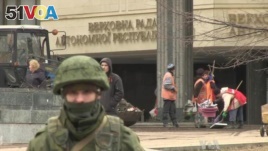March 01,2014
SIMFEROPOL, UKRAINE — Ukraine and Russia continue their standoff over Ukraine's Crimea Peninsula, where the movement of troops and vehicles, believed to be Russian military, has increased.
Unidentified soldiers took up positions outside parliament in Ukraine's autonomous Crimea Saturday, and the region's pro-Russian prime minister Sergiy Aksyanov appealed to Moscow for help.
As the Crimea crisis escalated sharply, pro-Moscow sentiments were echoed by regional parliament member Sergiy Tzekov.
"I hope Russia will react and other countries will also react and protect Crimea in this situation," he said.

The new Ukrainian government, which ousted pro-Russian president Viktor Yanukovych last week, said it wouldn't not react with force to what it called Russian provocations in Crimea.
But officials in Kyiv demanded that Moscow halted all military moves on the peninsula, home to a Russian naval base. Armed men and military vehicles, widely believed to be Russian, took hold of an increasing number of key installations, including roads and now-closed airports.
The Crimean prime minister also ordered all Ukrainian military forces and police to be placed under his control. Lawmaker Tzekov defended the decision.
"I think those who want civil calm and order in Crimea should understand that this is reasonable and they should listen to what the government of Crimea is saying," he said.
Many of Crimea’s ethnic Russian majority view Ukraine’s new leadership as illegal and have welcomed Russian support. Other Crimeans were appalled.
"No, I don't like this. We did not feel protected from our authorities before, and now there is just fear and panic. I don't understand how can one wake up one morning to live under a Russian flag? I don't understand this," said Eminia, a Simferopol resident.
Members of Crimea's minority Tatars also opposed the developments.
"This is not reasonable or inspired by the actions of the local population or political events. This is a direct occupation, or, one could say, putsch," said Crimean Tatar businessman Ali Uzenbash.
The local parliament has moved up a referendum on the region's status to the end of the month, but as events unfold, Crimea's future appears to go far beyond this building.